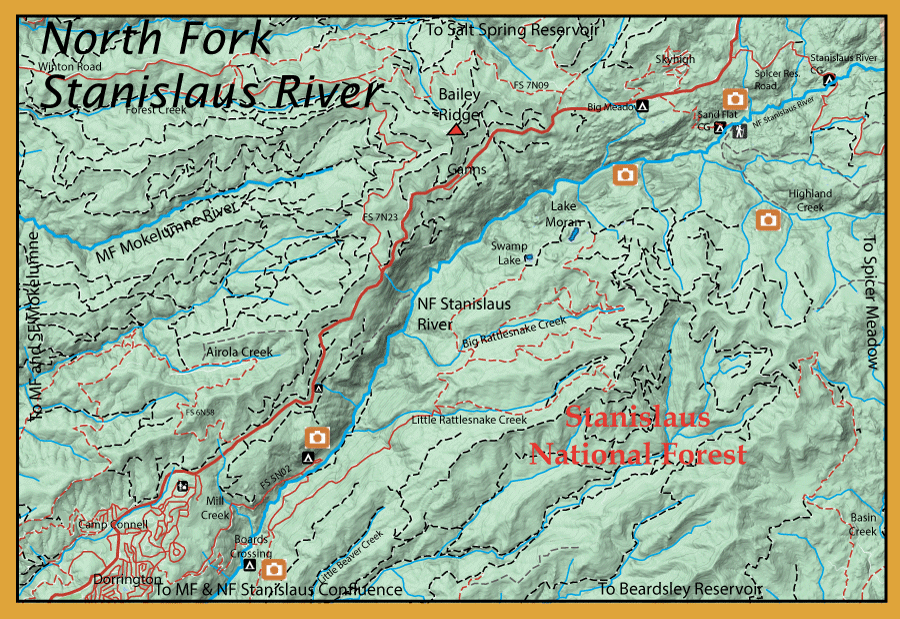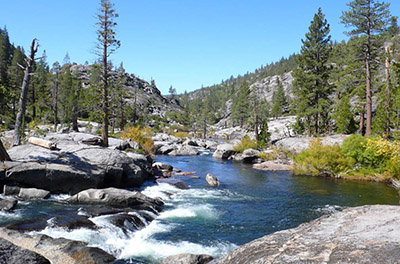North Fork Stanislaus River – a deep canyon with deep pools

Directions: The are three access sites to lower section. From Arnold on Hwy 4 go East 3.5 miles to Calaveras Big Trees State Park. 1) Big Trees: enter park and drive 4 miles toward South Grove. Access at bridge on South Grove Road. 2) Boards Crossing, go 1.5 miles past Big Trees to Dorrington on Hwy 4. Turn Southeast on Sourgrass-Boards Crossing Road (USFS #5N02, paved road). 2 miles from Dorriington turn South on Boards Crossing Road (USFS Road 5N75, dirt road), go 3 miles to river.3) Sourgrass: Stay on USFS Road #5N02 (2 miles from Dorrington), go 4 miles to river at Sourgrass. | ||
Notes:
The North Fork of the Stanislaus starts below Lake Alpine and travels some 65 miles to New Melones Dam near Angels Camp. It is a deep canyon with many boulders and rocks creating deep pools. The river contains Browns, Brookies, and Rainbows. Most of the access spots are stocked with planters, so you need to move away from the access positions to get into the wild trout, averaging 10-14″. The Calaveras Big Trees State Park access is well-stocked with planted rainbows. You need to go either upstream or downstream from the bridge to reach the wild trout. Board’s Crossing and Sourgrass Crossing are excellent areas to access the Stanislaus. The hatches on the North Fork Stanislaus River are not plentiful or regular. Stoneflies, Caddis, and Mayflies exist but anticipating the timing of the hatches is difficult. Generally, attractor dries work good as well as standard nymph patterns. Hopper and Ant patterns are also good during the mid-summer months. During June, a Golden Stone hatch can come off in which a stimulator pattern with an attractor beadhead nymph works well. By July, Little Yellow Sallies as well as Golden Stones will be around. By the end of July, Caddis nymphs and midges are effective during the early morning hours and, during the evening, a caddis or mayfly dry with a caddis emerger dropper will work well. August and September will be hopper time. A PMD hatch can start around August and remain until October. | ||
Fishing RegulationsNorth Fork Stanislaus River: From the last Saturday in April through November 15, five trout daily bag limit, 10 trout in possession; and, from November 16 through the Friday preceding the last Saturday in April, 0 trout bag limit, artificial lures with barbless hooks only and trout must be released unharmed and not removed from the water. Big Trees Creek (Tuolumne Co.) upstream from the confluence of Beaver Creek.: Closed to all fishing all year. Other Lakes and Reservoirs: Open all year. 5 trout. 10 in possession. No gear restrictions. Other creeks and tributaries: From the last Saturday in April through November 15, five trout daily bag limit, 10 trout in possession; and, from November 16 through the Friday preceding the last Saturday in April, 0 trout bag limit, artificial lures with barbless hooks only and trout must be released unharmed and not removed from the water.
| ||


